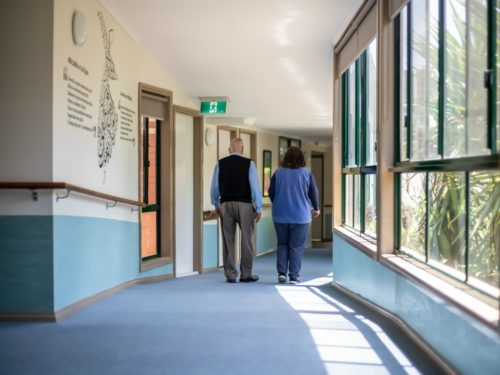 Every person has the right to freedom and respect and the right to be treated fairly by others. A person’s rights do not diminish when he or she moves into a nursing home, regardless of his or her physical or mental frailty or ability to exercise or fully appreciate his or her rights.
Every person has the right to freedom and respect and the right to be treated fairly by others. A person’s rights do not diminish when he or she moves into a nursing home, regardless of his or her physical or mental frailty or ability to exercise or fully appreciate his or her rights.
A positive, supportive and caring attitude by family, friends, nursing home or hostel proprietors and staff, carers and the community will help people who live in nursing homes or hostels to continue as integral, respected and valued members of society.
Australian society has a strong commitment to social justice principles. Those principles recognise the aspirations of all Australians to a dignified and secure way of life with equal access to health care, housing and education, and equal rights in civil, legal and consumer matters. They form the basis of a society, which is free of prejudice and is caring, just and humane.
Broadmeadows Turkish Islamic and Cultural Centre Inc.
This Charter affirms those social justice principles.
The personal, civil, legal and consumer rights of each Care Recipient are not diminished in any way when he or she moves into a nursing home or hostel.
The Charter also recognises that Care Recipients of nursing homes have the responsibility to ensure that the exercising of their individual rights does not affect others’ individual rights, including those providing care. The Charter recognises that Care Recipients have specific rights and responsibilities which balance the needs of the individual against the needs of the nursing home and hostel community as a whole.
Each Care Recipient of a residential care service has the RIGHT:
- to full and effective use of his or her personal, civil, legal and consumer rights;
- to quality care appropriate to his or her needs;
- to full information about his or her own state of health and about available treatments;
- to be treated with dignity and respect, and to live without exploitation, abuse or neglect;
- to live without discrimination or victimization, and without being obligated to feel grateful to those providing his or her care and accommodation;
- to personal privacy;
- to live in a safe, secure and homelike environment, and to move freely both within and outside the residential care service without undue restriction;
- to be treated and accepted as an individual, and to have his or her individual preferences taken into account and treated with respect;
- to continue his or her cultural and religious practices, and to keep the language of his or her choice, without discrimination;
- to select and maintain social and personal relationship with anyone else without fear, criticism or restriction;
- to freedom of speech;
- to maintain his or her personal independence;
- to accept personal responsibility for his or her own actions and choices, even though these may involve an element of risk, because the Care Recipient has the right to accept the risk and not to have the risk used as a ground for preventing or restricting his or her actions and choices;
- to maintain control over, and to continue making decisions about, the personal aspects of his or her daily life, financial affairs and possessions;
- to be involved in the activities, associations and friendships of his or her choice, both within and outside the residential care service;
- to have access to services and activities available generally in the community;
- to be consulted on, and to choose to have input into, decisions about the living arrangements of the residential care service;
- to have access to information about his or her rights, care, accommodation and any other information that relates to the Care Recipients personally;
- to complain and to take action to resolve disputes;
- to have access to advocates and other avenues of redress; and
- to be free from reprisal, or a well-founded fear of reprisal, in any form for taking action to enforce his or her rights.
Each Care Recipient of a residential care service has the RESPONSIBILITY:

- to respect the rights and needs of other people within the residential care service, and to respect the needs of the residential care service community as a whole;
- to respect the rights of staff and the proprietor to work in an environment free from harassment;
- to care for his or her own health and well-being, as far as he or she is capable; and
- to inform his or her medical practitioner, as far as he or she is able, about his or her relevant medical history and current state of health.
